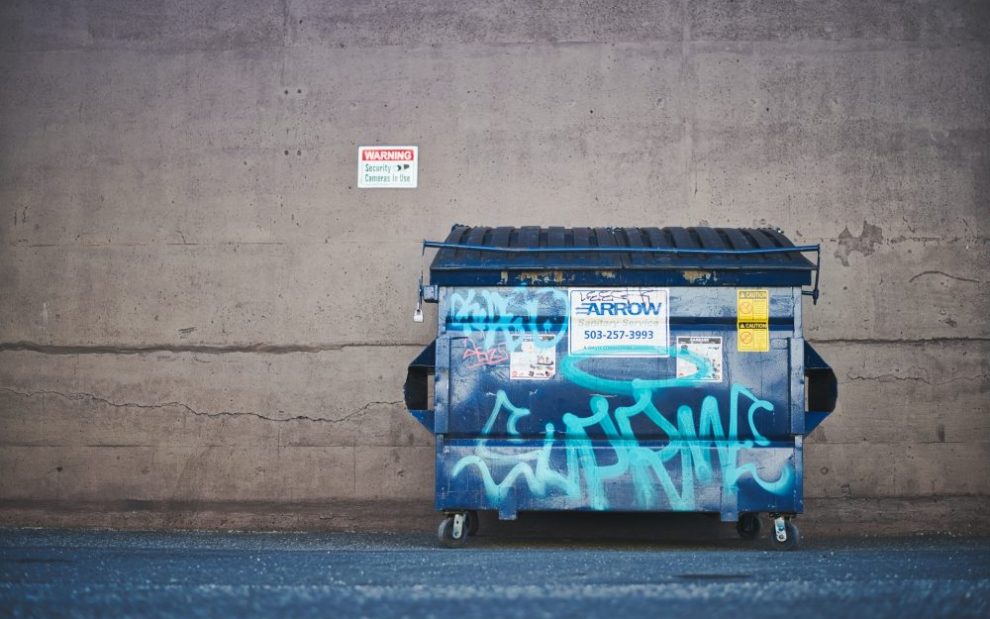As winter begins to melt away, I’m thinking about dumpster diving again. I started last year when I realized how much college students throw away at the end of the term. It was an idle hobby at first. Working part time and lonely in a new city, I biked up and down residential alleys on what I called a “gross, grown-up treasure hunt.” The themes of Holy Week—human failing and community, oppression and hope, death and resurrection—resonate with the political and spiritual themes that emerged as I dug through last summer’s garbage. Our trash tells stories about who we are, what we value, and how we’re hurting.
It’s warmer now, and soon students will move out again; these things move in cycles. When the rain stops, I plan to go to the alleys and see what I find.
Palm Sunday
Here are some things I’ve found in Chicago dumpsters: Red high heels, new in the box. 470 pesos. A bag of 80 golf balls. Obama’s autobiography, hardcover. Girl Scout cookies that expire next month. A Coach purse. Halloween decorations. A bike pump. Bowties in wild patterns. Cans of garbanzo beans. AirPods. A “seven piece cordial set in luxurious silverplate.”
Growing up, I thought the lesson of Palm Sunday was “people are fickle.” We like Jesus now, but we’re going to turn on him later in the week. As an adult, I know better than to blame the crowds. Pontius Pilate washed his hands of it, but the “invisible hand” of Caesar was dirty.
Sometimes I get mad at people for throwing so much away, but I remember a college friend who asked me to hold onto a mug and a stuffed animal when she graduated and left the country. Frantic, not fickle, she donated everything else to a church; she couldn’t afford to take it on the plane.
Holy Thursday
Last fall, my friends and I found a dumpster full of bags of frozen food. They hadn’t thawed yet so we filled our arms with carrots, tilapia, and pineapple cubes. We cooked some dinners and shared them with our housemates.
Another time, I found a sealed box of “sea salt pita crackers” in a dumpster. I was about to take a group of college students to El Salvador, so I packed the box as a travel snack. Every time I pulled it out, I took secret pleasure in those crackers. I didn’t have to buy pricey chips at the airport. When I got home, I shared the last few crackers with a friend who agreed that they were some of the best crackers we’d ever had.
Good Friday
Our dumpsters reveal the worst of us, collectively. Many things we throw away are things we never really wanted, like novelty sunglasses. They’re tacky and flimsy, but someone made them on the cheap and we bought them for a cheap laugh. When I find novelty sunglasses in the trash, I leave them there.
Dumpsters tell stories about cities, class, and power. Why didn’t people donate this stuff to a thrift store? The thrift stores are in the suburbs and people don’t have cars, or they’re moving out in a rush because something bad happened. Plus, some thrift stores are for-profit and throw lots of things away. Why didn’t people give this stuff to their neighbors? People don’t know their neighbors. They move in and out so quickly, and we spend our lives shuttling between home and work. Why did people buy this stuff? We buy too much because it makes us feel good for a minute, and God knows we don’t always feel good.
Sometimes there are worse things in the alleys. I saw a dead dog in a box.
Holy Saturday
We spend a lot of time waiting for the world we want to live in.
In the early days of COVID-19 lockdowns, people posted online about their new, homespun, slowed-down hobbies. Some baked bread. I sewed cloth masks and cross-stitched. Writer Emily Matchar has a book about “new domesticity,” the contemporary, countercultural movement toward crafts, “natural parenting,” and organic eating. New domesticity had a moment during lockdown. Many of us waxed poetic about what really matters. Three years later, this moment feels distant, even quaint. How many of us still bake bread? For most people, life has sped back up. When you work a grinding, thankless job, how can you afford to wait for the dough to rise?
Dumpster diving was one of those pandemic trends. TikTok channels and Facebook groups popped up about it, and I joined one of those groups. I see lots of subcultures and motives. Some people sell their stuff at a profit to feed their families. Others do mutual aid in their neighborhoods. People post about scraped knees, locked dumpsters, diapers, and security cameras.
My therapist tells me to think in percentages, not absolutes. What would it look like to be 5 percent slower? she might ask. Emily Matchar reminds us that “new domesticity” can get carried away; if we tell everyone to spin their own thread, weave their own fabric, and then sew their own clothes, they won’t take us seriously. But 5 percent slower? Sure, I can darn my socks instead of buying new ones. I can spend an hour dumpster diving to stock up on food for the week. It’s not enough, but maybe I’ll see something emerging from the cracks in my routines. Maybe we can practice waiting and see if waiting turns into something else. I can wait for the dough to rise 5 percent of the time.
Easter Sunday
I gave the colorful bowties to a queer friend who wears them all the time. I gave the pesos to a friend who lives in El Paso, Texas and supports migrants in Juárez, Mexico. I kept the bike pump for me and my housemates.
In radical spaces, I’ve heard people talk about “composting” oppressive systems. It’s good imagery; the breakdown of organic matter becomes rich, dark soil to nourish new growth. When we hear a good ecological metaphor, we feel it in our gut. It’s why Christians in the northern hemisphere draw connections between Easter and spring. The snow melts and the ground smells fresh, like dead leaves. The tulips and daffodils come back to life.
Pulling something from a dumpster and giving it new life could be called holy. It’s not to say all junk is holy—I can’t argue for the divinity of heart-shaped novelty sunglasses—but everyone knows there’s something special about washing away the dirt to see what’s underneath. In 2017, the Illinois Environmental Protection Agency said the state would run out of space for garbage in the next 20 years.
Sometimes I fill the basket on my bike. I tell myself it’s 5 percent more resurrection.
Image: Unsplash/Kevin Butz














Add comment